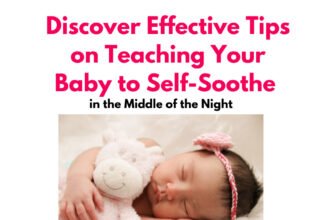
As a parent of a 4-month-old, you may wonder how much sleep your little one needs. Our expert recommendations and tips can help guide you through this crucial phase. Read on to learn about the optimal amount of sleep for a 4-month-old and how to establish healthy sleep habits.
As a new parent, you’re likely familiar with the challenges of getting your little one to sleep through the night. But did you know that the amount of sleep a 4-month-old needs can vary depending on a variety of factors? From growth spurts to developmental milestones, there are many reasons why your baby may require more or less sleep than you expect. In this article, we’ll dive into the expert recommendations and tips for how much sleep a 4-month-old needs, so you can help your little one get the rest they need to thrive.
How Much Sleep Does a 4-Month-Old Need
When it comes to parenting a 4-month-old, sleep is often one of the most discussed topics. How much sleep does a 4-month-old need? The answer isn’t always straightforward since every baby is different, but there are some general guidelines you can follow.
On average, a 4-month-old needs between 12-16 hours of sleep per day. This includes both daytime naps and nighttime sleep. Some babies may sleep more, while others may sleep less, but as long as your little one is healthy and thriving, there’s no need to worry.
So, how do you know if your baby is getting enough sleep?
One way to tell is by observing their behavior. If your baby is alert, happy, and content during their waking hours, chances are they’re getting the sleep they need. On the other hand, if they’re fussy, irritable, or seem overly tired, they may not be getting enough sleep.
To help your baby get the right amount of sleep, it’s important to establish a consistent sleep routine. This includes creating a bedtime routine, such as a bath, massage, and storytime, to signal to your baby that it’s time for sleep. You can also establish a consistent nap schedule, which will help your baby learn when it’s time to sleep during the day.
Another important factor in helping your baby get the sleep they need is creating the right sleep environment. This means ensuring that your baby’s sleep space is quiet, dark, and comfortable. You may also want to consider using white noise, such as a sound machine or a fan, to help block out any distracting noises.
When it comes to choosing products to help your baby sleep, there are a few things to keep in mind. Firstly, it’s important to prioritize safety. Look for products that meet safety standards, such as those set by the Consumer Product Safety Commission (CPSC). Secondly, consider the functionality of the product. For example, a swaddle blanket can help your baby feel secure and comfortable, while a sleep sack can provide warmth without the risk of loose bedding.
Here are a few products that come highly recommended by parents and experts alike:
Halo SleepSack: This wearable blanket is designed to keep your baby warm and snug while also reducing the risk of loose bedding. It’s made from breathable cotton and comes in a variety of sizes and styles.

SwaddleMe Original Swaddle:
Swaddling can help your baby feel secure and calm, and the SwaddleMe Original Swaddle makes it easy to get a snug and safe fit. It features adjustable wings that can be fastened with hook and loop closures.

Marpac Dohm White Noise Machine
This sound machine produces a gentle, soothing white noise that can help block out distracting sounds and promote sleep. It’s easy to use and has an adjustable volume and tone.

While every baby is different, on average, a 4-month-old needs between 12-16 hours of sleep per day. To help your little one get the rest they need, establish a consistent sleep routine, create a comfortable sleep environment, and choose safe and functional sleep products.
With a little patience and persistence, you can help your baby develop healthy sleep habits that will benefit them for years to come.
Also Read – Top 20 Proven baby care tips for new moms: Expert Advice for a Smooth Parenting Journey
What is circadian rhythm?
In simple terms, the circadian rhythm is the body’s internal clock that helps regulate various bodily functions, including sleep and wakefulness. It operates on a roughly 24-hour cycle and is influenced by external factors such as light and temperature. The circadian rhythm helps the body know when it’s time to be awake and active, and when it’s time to rest and recover.
At what age do babies develop a circadian rhythm?
Babies develop a circadian rhythm, also known as a sleep-wake cycle, at around 6-8 weeks of age. This is when their brain starts to produce the hormone melatonin, which helps regulate sleep and wakefulness.
For babies, developing a consistent circadian rhythm can help promote healthy sleep habits and improve overall health and wellbeing. It’s important to establish a consistent sleep routine and provide a sleep-conducive environment to help support your baby’s circadian rhythm.
Also read – How can I help my baby sleep through the night?
Do babies sleep patterns change at 3 months?
Yes, a baby’s sleep patterns can change at around 3 months of age. At this age, babies may start to sleep for longer stretches at night and may begin to develop a more predictable sleep routine. However, it’s important to note that every baby is different and may not follow a strict timeline for these changes. Additionally, some babies may experience sleep regressions at around 3-4 months due to developmental milestones, which can disrupt their sleep patterns. It’s important to be patient and consistent with your baby’s sleep routine and to talk to your pediatrician if you have concerns about your baby’s sleep.
Also Read – How Much do Newborns Sleep (Decoding Newborn Sleep)
How many naps should my 4-month-old take each day?
On average, a 4-month-old should take 3-4 naps per day, each lasting around 45 minutes to 2 hours. However, every baby is different, and some may take more or fewer naps depending on their individual needs.
How do I establish a bedtime routine for my 4-month-old?
A consistent bedtime routine can help signal to your baby that it’s time for sleep. Try incorporating activities such as a bath, massage, and storytime before putting your baby down to sleep. The routine should be calming and predictable, which can help your baby relax and feel secure.
What’s the Best 4-Month-Old Sleep Schedule?
The best 4-month-old sleep schedule may vary depending on your baby’s individual needs, but there are some general guidelines that can help you establish a healthy sleep routine.
At 4 months of age, most babies need around 14-16 hours of sleep per day, with around 10-12 hours at night and 3-4 hours during the day in the form of 3-4 naps. Some babies may take longer naps or need more frequent naps, while others may need fewer naps or shorter naps.
To establish a healthy sleep routine, try to create a consistent sleep environment that is quiet, dark, and cool. Stick to a predictable bedtime routine, such as a bath, a story, and a feeding before putting your baby down to sleep. Aim for a consistent bedtime and wake-up time to help regulate your baby’s internal clock.
It’s important to note that babies’ sleep needs can vary, and it’s normal for them to experience sleep regressions or disruptions due to developmental milestones or other factors. Be patient and consistent with your sleep routine, and don’t hesitate to reach out to your pediatrician if you have concerns about your baby’s sleep.
Is it normal for my 4-month-old to wake up frequently during the night?
Yes, it’s normal for 4-month-olds to wake up frequently during the night. They may need to be fed or have a diaper change, and they may also experience sleep regressions due to developmental milestones. Be patient and consistent with your sleep routine, and remember that this phase will eventually pass.
What can I do if my 4-month-old is waking up too early in the morning?
If your baby is waking up too early in the morning, it could be a sign that they need an earlier bedtime or an extra nap during the day. You can also try adjusting the sleep environment, such as using blackout curtains to block out early morning light.
Is it safe for my 4-month-old to sleep with a pacifier?
Yes, it’s generally safe for babies to sleep with a pacifier, as long as it’s used properly and meets safety standards. The American Academy of Pediatrics (AAP) recommends offering a pacifier at bedtime and naptime to help reduce the risk of Sudden Infant Death Syndrome (SIDS).
How can I tell if my 4-month-old is getting enough sleep?
You can tell if your baby is getting enough sleep by observing their behavior. If they are alert, happy, and content during their waking hours, they are likely getting the sleep they need. On the other hand, if they seem overly tired, fussy, or irritable, they may not be getting enough sleep.
I hope these answers are helpful for moms who may have similar questions about their 4-month-old’s sleep. Remember to be patient and consistent with your sleep routine, and don’t hesitate to reach out to your pediatrician if you have any concerns.







